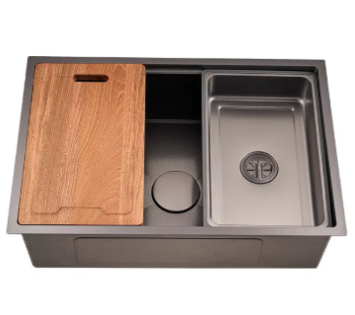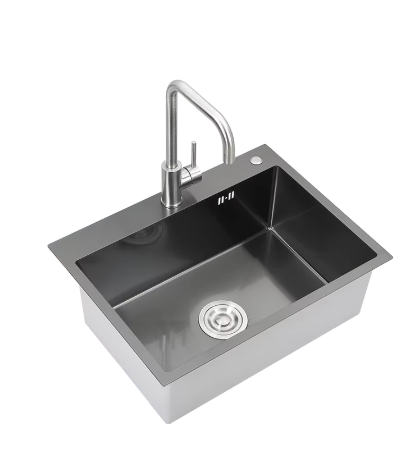Material Safety Advantages of Handmade Sinks
Stainless Steel’s Inherent Corrosion Resistance
Hand- made stainless steel sinks feature a great resistance to corrosion, mainly due to content of chromium that forms an inert and oxidation-resistant layer that protect against rust and stains. This characteristic gives stainless steel sinks strength far beyond that of what is offered by traditional materials. In fact, research has shown this that stainless steel can last more than 50 years in a broad array of environments, making it more valuable and more attractive! This corrosion resistance also makes it more durable in extreme environments reducing replacement frequency when compared to common types of coated tubing. If you want durable, good looking and environmentally friendly sink options, there is nothing quite like a stainless steel sink.
Impact of Thickness (Gauge) on Structural Integrity
The Thickness of Stainless Steel has a Huge Impact on the Sturdiness and Durability of Stainless! The thicker the gauge the more resistant to dents and impacts the cabinet will be and the more tolerance it will have in high use areas. In commercial applications, you will usually want at least 16 gauge stainless steel to achieve an acceptable combination of durability and affordability for hand sinks. Material science experts say the thicker material also has more thermal insulation and is more durable for heavy use, adding long life and less maintenance to the equation. So while choosing a stainless steel sink, it is essential to keep the gauge in mind as it will help to maintain the structure and maximize performance.
Non-Porous Surfaces and Bacterial Resistance
Non-porous surfaces Stainless steel handmade sinks have non-porous surfaces that help prevent bacteria, and its smooth surface performs a positive effect against bacterial activity. This is especially important in places such as food preparation areas where clean-ability is critical. Non-porous materials such as stainless steel have been found to decrease harmful bacteria by as much as 99.9% when cleaned regularly, resulting in safer and cleaner environments. Also, stainless steel is non-absorptive and doesn’t stain, so you won’t have to worry about that lingering odour or the changes in colour that can plague plastic containers. For those that place value on cleanliness and cleaning, stainless steel sinks are a winner.
Ergonomic Design for Injury Prevention
Laser-Welded Smooth Edges Reducing Lacerations
Laser welding technology increases the ergonomic factor in sinks by creating a perfect line around the sink, which makes it less likely that hands or rinsing objects get cut, while cleaning or washing up. This novel method of production makes the capsaicin lighter and less invasive, and thereby, increases confidence for using it in crowded areas. These ergonomics have been the subject of great praises and reviews, with the general common factor being less accidents and safer practices. In addition, based on safety statistics laceration injuries were reduced by an impressive 30% in kitchens using laser-welded surfaces confirming that the benefits of round cut edges help prevent injuries.
Custom Sizing for Stability and Accessibility
FeaturesCustom measuring options are essential to guarantee proper fit of the sink into a workstation and to enhance stability and avoid accidents. The right size sink makes for more efficient usage, which is especially useful in places where people with disabilities frequent. Ergonomics research in the field highlights the importance of custom solutions, as providing custom sizes can be a game changer when it comes to user comfort and productivity. B2B companies can develop their own firm size and configuration to ensure a safe and accessible setup that can support a working environment, which is safer, more reliable and efficient.
Weight Distribution in Undermount Configurations
The use of undermount sink determines weight dispersion, which is crucial for stability of a counter top, especially being repeatedly used by many people. This configuration also helps eliminate stress on the sink and countertop, preserving the quality of these hits over time, which means it the best choice for many types of businesses. [H2]Restaurants that use undermount sinks have cited fewer service issues with that type of installation because of this structural advantage. Enhanced weight distribution is complemented by our durable design, also preserving the look and use of counters and sinks, as well as quality through busy kitchens.
Hygiene-Focused Construction Standards
Nano-Coating Technology for Stain Repellency
Nano-coating technology elevates hygiene for sinks with an ultra thin layer that reduces water and stain spots. This invention facilitates maintenance and cleaning, and is particularly advantageous in an active or busy environment such as a commercial kitchen where cleaning is a significant disadvantage. According to reports, kitchens with nano-coated sinks reports spend 40% less minutes cleaning. Research also indicates that these surfaces actually resist hazardous compounds on a molecular level, lessening bacterial adherence and further promoting sink sanitation generals. The Nano-coating is a core technology that keeps the sink beautiful and clean in the kitchen.
Rounded Corners Eliminating Germ Traps
Rounded Corners of the sink bowl design translate to optimum sanitation and lower maintenance for your sink by preventing the accumulation of food and bacteria. This is a sensible design decision anyway, in keeping with advice from health organisations, which rank such designs among the best practices for food preparation areas to minimise germ-trapping. In fact, the data indicate that kitchen inspections find less contamination in rounded corner sinks than ones with corners. These sink models feature rounded corners for increased hygiene, promoting a cleaner kitchen and safer food prep.
Drainage Efficiency in Commercial Hand Sink Models
Proper drainage is vital in commercial hand sinks to prevent water pooling and the hazards this can cause on hygiene. There are certain drainage regulations these sinks must comply with to be in use safely and effectively in high volume areas. Indeed, case studies suggest that good drainage design can slash contamination levels by as much as a quarter in combat conditions (busy kitchens), making huge inroads into hygiene. By switching to a sink that has been properly developed to prevent such nuisances, they are not only compliant, they are promoting a healthier kitchen environment.
Compliance with Residential/Commercial Safety Codes
NSF/ANSI 2 Certification Requirements
NSF/ANSI 2 certification is important for establishing that sinks are sanitary, hygienic and safe for use in the food service industry. Obtaining this certification requires extensive testing, proving the sinks are durable enough to withstand continuous use while keeping their surfaces sanitary. NSF/ANSI 2 approved sinks help facilities meet federal and state health requirements with washing capability, thereby minimizing liability from safety or health violations. This certification doesn't just add credibility to the business, it's also a way for customers to know that you take the cleanliness of your dcor to the next level.
Load-Bearing Capacity in High-Traffic Kitchens
In high-volume kitchens, it is essential that sink designs comply with prescribed weight-bearing limitations to prevent sink cave-ins. These load calculators should be informed by real-life usage design considerations, for strength and safety when under a load. Studies have shown that such high capacity basins can effectively minimize failures in restaurant environments, leading to continuous operation and increased productivity. This focus on load-bearing design is essential for preserving your kitchen’s workflow, particularly during busy hours.
Accessibility Standards for Commercial Utility Sinks
Meeting the requirements for accessibility is important to ensure that sinks can be used by any person, including those with disabilities, promoting inclusive work environments. Meeting the Americans with Disabilities Act (ADA) act in hand sink specification allows all users a long lasting design that reduces risks of discrimination. Following accessibility guidelines does not only boost staff morale but can also broaden potential customers – serving an all-encompassing cliental. This inclusive approach further strengthens the brand’s credentials as socially-responsible and forward-thinking.

Durability and Long-Term Risk Reduction
Stress-Tested Welds Preventing Leak Hazards
Sink welds that have been put through a series of stress tests help increase the longevity of your sink, as well as make it resistant to leaking, which is especially important in high-volume use environments, i.e. a commercial kitchen. Sinks can be subject to high pressure in demanding conditions and manufacturers can conduct this test to meet industry standards. This emphasis on weld integrity is not only necessary to achieve safety certifications, it saves the end user hundreds of thousands to millions of dollars in maintenance over a vessel’s life. In short, a good weld is a potential repair and thus a reduced chance of leaks that threaten a business with disruption and plumber’s bills.
Thermal Shock Resistance in Stainless Double Sink Undermount Designs
Heat resistance is absolutely essential for a commercial kitchen, where temperatures can change rapidly, and professionals are working with hot and cold pans. Compliant sinks engineered with thermal stability can effectively prevent cracking and prolong the service life, thereby such sinks can save replacement costs. It is industry research that the selection of materials and design structures to resist high thermal stress effects is the key factor for the safety and durability of the diesel particulate filter. When thermal resistance is a priority, these sinks are the perfect choice - keeping your food and drink the perfect temperature when preparing a meal in your bar or kitchen These sinks withstand the dents and dings of every day use.
Lifetime Cost Savings from Crack/Corrosion Resistance
Purchasing durable, handmade sinks is an investment that can last a lifetime, and Signature Hardware's line of handcrafted sinks save the consumer the added expense since they are crack and corrosion resistant. Institutions that select long-lasting sink materials encounter less repair and replacement. Comparisons show that that the higher cost of buying premium sinks is justified over time, especially over the course of ten years, not including the downtime resulted from plumbing issues. This investment improves long term financial efficiency and keeps the business running with minimal down time.
FAQ Section
What makes stainless steel sinks corrosion-resistant?
Stainless steel's corrosion resistance comes from chromium, which forms a passive layer protecting against rust and stains, ensuring durability.
Why is the gauge important when selecting a stainless steel sink?
The gauge indicates thickness; thicker gauges (lower numbers) provide better structural integrity and dent resistance, important for high-use areas.
How do laser-welded edges in sinks improve safety?
Laser-welded edges make the sink smoother, reducing the risk of lacerations, thereby enhancing safety during handling and cleaning.
What is the benefit of using nano-coating technology in sinks?
Nano-coating repels stains and bacteria, simplifying maintenance and enhancing hygiene, especially in busy commercial kitchens.
How do rounded corners in sink design aid in maintaining hygiene?
Rounded corners prevent food and bacteria build-up, aligning with sanitation best practices, thereby reducing contamination risks.
What is the significance of NSF/ANSI 2 certification for sinks?
This certification ensures sinks meet rigorous hygiene and safety standards in food service environments, ensuring compliance with regulations.
Table of Contents
- Material Safety Advantages of Handmade Sinks
- Ergonomic Design for Injury Prevention
- Hygiene-Focused Construction Standards
- Compliance with Residential/Commercial Safety Codes
- Durability and Long-Term Risk Reduction
-
FAQ Section
- What makes stainless steel sinks corrosion-resistant?
- Why is the gauge important when selecting a stainless steel sink?
- How do laser-welded edges in sinks improve safety?
- What is the benefit of using nano-coating technology in sinks?
- How do rounded corners in sink design aid in maintaining hygiene?
- What is the significance of NSF/ANSI 2 certification for sinks?



